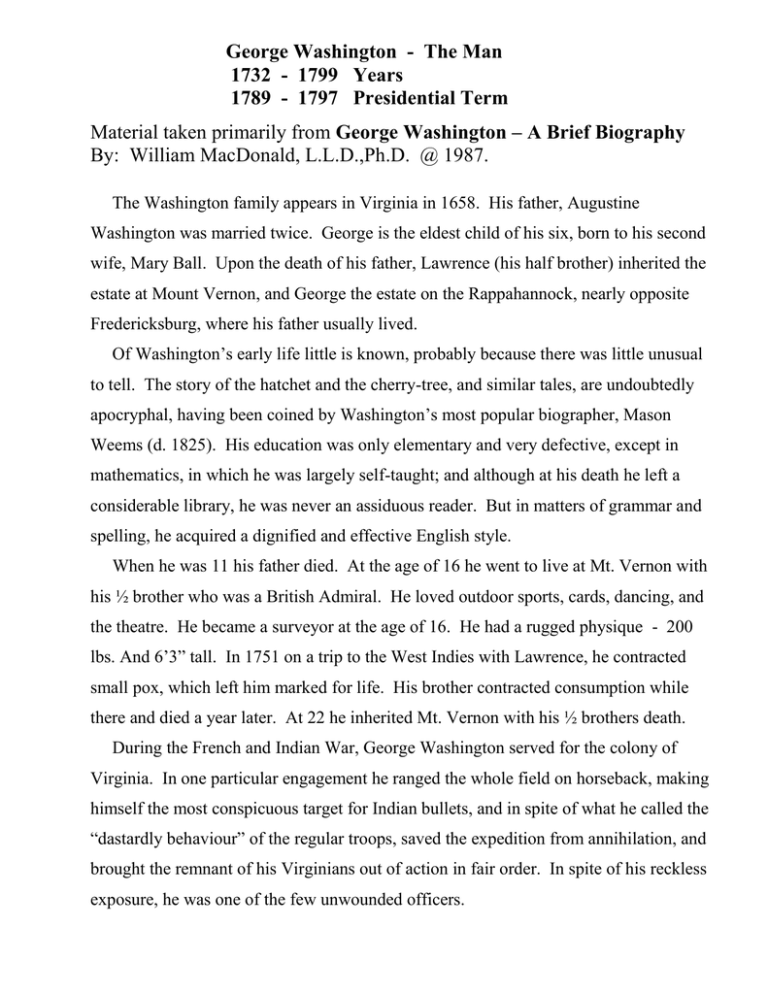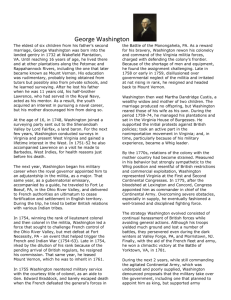George Washington
advertisement

George Washington - The Man 1732 - 1799 Years 1789 - 1797 Presidential Term Material taken primarily from George Washington – A Brief Biography By: William MacDonald, L.L.D.,Ph.D. @ 1987. The Washington family appears in Virginia in 1658. His father, Augustine Washington was married twice. George is the eldest child of his six, born to his second wife, Mary Ball. Upon the death of his father, Lawrence (his half brother) inherited the estate at Mount Vernon, and George the estate on the Rappahannock, nearly opposite Fredericksburg, where his father usually lived. Of Washington’s early life little is known, probably because there was little unusual to tell. The story of the hatchet and the cherry-tree, and similar tales, are undoubtedly apocryphal, having been coined by Washington’s most popular biographer, Mason Weems (d. 1825). His education was only elementary and very defective, except in mathematics, in which he was largely self-taught; and although at his death he left a considerable library, he was never an assiduous reader. But in matters of grammar and spelling, he acquired a dignified and effective English style. When he was 11 his father died. At the age of 16 he went to live at Mt. Vernon with his ½ brother who was a British Admiral. He loved outdoor sports, cards, dancing, and the theatre. He became a surveyor at the age of 16. He had a rugged physique - 200 lbs. And 6’3” tall. In 1751 on a trip to the West Indies with Lawrence, he contracted small pox, which left him marked for life. His brother contracted consumption while there and died a year later. At 22 he inherited Mt. Vernon with his ½ brothers death. During the French and Indian War, George Washington served for the colony of Virginia. In one particular engagement he ranged the whole field on horseback, making himself the most conspicuous target for Indian bullets, and in spite of what he called the “dastardly behaviour” of the regular troops, saved the expedition from annihilation, and brought the remnant of his Virginians out of action in fair order. In spite of his reckless exposure, he was one of the few unwounded officers. After the war in January 1759 he married Martha, the widow of Daniel Parke Curtis. She brought to the marriage $100,000 in property, making him one of the richest men in the colonies. She also brought to the marriage two young children by her first husband, and although George and Martha had no children together, he raised her children and grandchildren as his own. For the next fifteen years Washington’s life at Mount Vernon was that of a typical Virginia planter of the more prosperous sort, a consistent member and vestryman of the Established (Episcopal) Church, a large slave-holder, a strict but considerate master, and a widely trusted man of affairs. His attitude towards slavery has been much discussed, but it does not seem to have been different from that of many other planters of that day: he did not think highly of the system, but had no invincible repugnance to it, and saw no way of getting rid of it. In his treatment of slaves he was exacting, but not harsh, and was averse to selling them save in case of necessity. Like others of the dominant planter class in Virginia, he was repeatedly elected to the House of Burgesses, but the business which came before the colonial assembly was for some years of only local importance, and he is not known to have made any set speeches in the House, or to have said anything beyond a statement of his opinion and the reasons for it. On the 5th of August 1774 the Virginia Convention appointed Washington as one of seven delegates to the first Continental Congress, which met in Philadelphia on the 5th of September, and with this appointment his national career, which was to continue with but two brief intervals until his death, begins. His attitude towards the mother country at this time, however, must not be misunderstood. Much as he expected war, he was not yet ready to declare in favour of independence, and he did not ally himself with the party of independence until the course of events made the adoption of any other course impossible. In March 1775 he was appointed a delegate from Virginia to the second Continental Congress, where he served on committees for fortifying New York, collecting ammunition, raising money and formulating army rules. It seems to have been generally understood that, in case of war, Virginia would expect him to act as her commander-in-chief, and it was noticed that, in the second Congress, he was the only member who habitually appeared in uniform. The two most powerful colonies were Virginia and Massachusetts. The war began in Massachusetts, troops from New England flocking to the neighbourhood of Boston almost spontaneously; but the resistance, if it was to be effective, must have the support of the colonies to the southward, and the Virginia colonel who was serving on al the military committees of Congress, was the obvious as well as the politic choice. When Congress, after the fights at Lexington and Concord, resolved that the colonies ought to be put in a position of defense, the first practical step was the unanimous selection (June 15), on motion of John Adams of Massachusetts, of Washington as commander-in-chief of the armed forces of the United Colonies. Refusing any salary and asking only the reimbursement of his expenses, he accepted the position. His expenses during the war, including secret service money came to $64,000; in addition he expended a considerable amount from his private fortune, for which he made no claim to reimbursement. He refused to accept a salary as commander-in-chief as well as during his presidency. The army, at the end of the war, was justly dissatisfied with its treatment. The officers were called to meet at Newborgh, and it was the avowed purpose of the leaders of the movement to march the army westward, appropriate vacant public lands as part compensation for arrears of pay, leave Congress to negotiate for peace without an army, and “mock at their calamity and laugh when their fear cometh.” Less publicly avowed was the purpose to make their commander-in-chief king, if he could be persuaded to aid in establishing a monarchy. Washington put a summary stop to the whole proceeding. When the Federal Convention met in Philadelphia in May 1787 to frame the present constitution, Washington was present as a delegate from Virginia, though much against his will; and a unanimous vote at once made him the presiding officer. Naturally, therefore, he did not participate in debate; and he seems to have spoken but once, and then to favour an amendment reducing from 40,000 to 30,000 the minimum population required as a basis of representation in the House. The mere suggestion, coming from him, was sufficient, and the change was at once agreed to. He approved the Constitution, which was decided upon, believing, as he said, “that it was the best constitution which could be obtained at that epoch, and that this or a dissolution awaits our choice, and is the only alternative.” As president of the convention he signed the Constitution, and kept the papers of the convention until the adoption of the new government, when they were deposited in the Department of State. The unanimous vote of the electors made him the first President of the United States; their unanimous vote elected him for a second time in 1792-1793; and even after he had positively refused to serve for a third term, two electors voted for him in 1796-1797. Washington seems never to have understood fully either the nature, the significance, or the inevitable necessity of party government in a republic. Instead, he attempted to balance party against party, selected representatives of opposing political views to serve in his first cabinet, and sought in that way to neutralize the effects of parties. The consequence was that the two leading members of the cabinet became Alexander Hamilton and Thomas Jefferson, exponents for the most part of diametrically opposite political doctrines. While espousing no political party, the unconscious drift of Washington’s mind was toward the Federalist Party. Martha Washington was a good first lady – and she saw herself as a good housewife. Due to the Whiskey Rebellion and the French Revolution – the last days of Washington’s term were not pleasant ones. Upon the completion of his second term he retires in 1797 and returned to Mount Vernon. Mount Vernon had suffered from neglect during his absence. He resumed the plantation life which he loved, the society of his family, and the care of his slaves. Washington had 300 slaves of which 90 were mansion slaves. He had resolved some time before never to obtain another slave, and “wished from his soul” that Virginia could be persuaded to abolish slavery; “it might prevent much future mischief”; but the unprecedented profitableness of the cotton industry, under the impetus of the recently invented cotton gin, had already begun to change public sentiment regarding slavery, and Washington was too old to attempt further innovations. Visitors continued to flock to him, and his correspondence, as always, took a wide range. In 1798 he was made commander-in-chief of the provisional army raised in anticipation of war with France. In the midst of these military preparations he was struck down by sudden illness, which lasted but for a day, and died at Mount Vernon on the 14th of December 1799. His disorder was an edematous affection of the wind-pipe, contracted by exposure during a long ride in a snowstorm, and aggravated by neglect and by such contemporary remedies as bleeding, gargle of “molasses, vinegar and butter” and “vinegar and sage tea,” which “almost suffocated him,” and a blister of cantharides on the throat. “First in war, first in peace, and first in the hearts of his countrymen.” His will contained a provision freeing his slaves, and a request that no oration be pronounced at his funeral. His remains rest in the family vault at Mount Vernon. La Fayette said that Washington’s hands were “the largest he ever saw on a man.” At his death Washington measured only 6’ tall. Washington was childless: the people of his time said he was the father only of his country.



